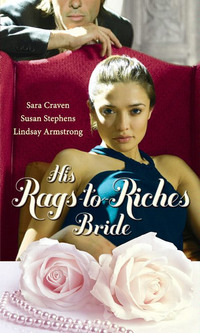
Полная версия
His Reluctant Bride: The Marchese's Love-Child / The Count's Blackmail Bargain / In the Millionaire's Possession

Former journalist SARA CRAVEN published her first novel ‘Garden of Dreams’ for Mills & Boon in 1975. Apart from her writing (naturally!) her passions include reading, bridge, Italian cities, Greek islands, the French language and countryside, and her rescue Jack Russell/cross Button. She has appeared on several TV quiz shows and in 1997 became UK TV Mastermind champion. She lives near her family in Warwickshire – Shakespeare country.
His Reluctant Bride
The Marchese’s Love-Child
The Count’s Blackmail Bargain
In The Millionaire’s Possession
Sara Craven

www.millsandboon.co.uk
Table of Contents
Cover
About the Author
Title Page
The Marchese’s Love-Child
CHAPTER ONE
CHAPTER TWO
CHAPTER THREE
CHAPTER FOUR
CHAPTER FIVE
CHAPTER SIX
CHAPTER SEVEN
CHAPTER EIGHT
CHAPTER NINE
CHAPTER TEN
CHAPTER ELEVEN
CHAPTER TWELVE
CHAPTER THIRTEEN
The Count’s Blackmail Bargain
CHAPTER ONE
CHAPTER TWO
CHAPTER THREE
CHAPTER FOUR
CHAPTER FIVE
CHAPTER SIX
CHAPTER SEVEN
CHAPTER EIGHT
CHAPTER NINE
CHAPTER TEN
CHAPTER ELEVEN
CHAPTER TWELVE
In the Millionaire’s Possession
CHAPTER ONE
CHAPTER TWO
CHAPTER THREE
CHAPTER FOUR
CHAPTER FIVE
CHAPTER SIX
CHAPTER SEVEN
CHAPTER EIGHT
CHAPTER NINE
CHAPTER TEN
CHAPTER ELEVEN
CHAPTER TWELVE
Copyright
CHAPTER ONE
‘YOU’RE going back to Italy?’ There was outrage in Lily Fairfax’s voice as she turned on her daughter. Anger too. ‘Oh, I don’t believe it. You can’t—you mustn’t.’
Polly Fairfax sighed soundlessly. ‘Mother, I’m escorting an elderly lady to Naples, where she’ll be met by her family, upon which—I catch the next flight home. I’ll be gone for a few hours at most. Hardly Mission Impossible.’
‘You said you’d never return there,’ her mother said. ‘You swore it.’
‘Yes, I know,’ Polly acknowledged wearily. ‘But that was three years ago. And circumstances change. This is a work assignment, and there’s no one else to do it. Since Safe Hands was featured on that holiday programme, we’ve been snowed under with requests.’ She adopted a persuasive tone. ‘And you enjoyed seeing me on television—you know you did.’ She added a smile. ‘So you can’t complain if I’m in demand as a consequence.’
Mrs Fairfax wasn’t pacified. ‘Is this why this woman—this Contessa Whatsit wants you? Because you’ve been on television?’
Polly laughed. ‘I shouldn’t think so for a moment. She’s far too grand to bother with anything so vulgar. And her name’s the Contessa Barsoli.’
Her mother dismissed that impatiently. ‘I didn’t think you liked her very much.’
Polly shrugged. ‘I don’t particularly. She’s been a total pain the whole week I’ve been with her. And I’m damned sure she doesn’t care for me either,’ she added musingly. ‘She always looks at me as if I’m a slug in her salad. Believe me, I shan’t be tempted to linger.’
‘Then why did she choose you?’
‘The devil she knows, perhaps.’ Polly shrugged again. ‘As opposed to some stranger. Anyway, she needs someone to see to her luggage, and make sure she’s got all her documentation. Which is where Safe Hands comes in, of course.’
She leaned forward. ‘To be honest, Mum, I don’t know how much longer I can go on turning down jobs in Italy, just because of something that happened three years ago. I like my job, and I want to hang on to it. But Mrs Terence is running a business here, not an agency for people who’ve been crossed in love.’
‘It was,’ her mother reminded her tightly, ‘rather more than that.’
‘Whatever.’ Polly bit her lip. ‘But I can’t pick and choose my clients, and I think Mrs T has made all the allowances over Italy that she’s going to. So I have to treat it as just another destination from now on.’
‘And what about Charlie?’ Mrs Fairfax demanded fiercely. ‘What’s going to happen to him while you’re gadding off?’
It hardly seemed to Polly that enduring another twenty-four hours in the company of a disdainful Italian autocrat counted as ‘gadding’.
And her mother had never objected to her role as child-minder before, even when Polly was absent on other, much longer trips. In fact she’d declared that Charlie’s presence had given her a new lease of life.
She looked out of the window to where her cheerful two-year-old was trotting about after his grandfather, picking up hedge clippings.
She said slowly, ‘I thought he would stay with you, as usual.’
There were bright spots of colour in her mother’s face. ‘But it’s not usual—is it? You’re deliberately defying my wishes—yet again. I was totally against your taking that job in Sorrento three years ago, and how right I was. You came slinking home pregnant by some local Casanova, who didn’t want to know about you any more. Can you deny it?’
‘To be fair, Sandro had no more idea that I was expecting a baby than I did myself,’ Polly said levelly. ‘Although I agree it would have made no difference if he had known. But that’s all in the past. I’ve—rebuilt my life, and he’ll have moved on too.’ She paused. ‘All the same, I promise not to go within ten miles of Sorrento, if that will make you feel better.’
‘I’d feel better if you didn’t go at all,’ her mother returned sharply. ‘But if it really is just a day trip, I suppose I can’t stop you.’
‘You’ll hardly know I’ve gone,’ Polly assured her. ‘Thanks, Mum.’ She gave her a swift hug. ‘You’re a star.’
‘I’m an idiot,’ Lily Fairfax retorted, but she sounded slightly mollified. ‘Are you going to stay for supper? I’ve made one of my steak pies.’
‘It’s good of you, darling,’ said Polly, mentally bracing herself for another battle. ‘But we must get back. I have this trip to prepare for.’
Mrs Fairfax gave her a tragic look. ‘But I’ve got Charlie’s favourite ice-cream for dessert. He’ll be so disappointed.’
Only because you’ve already told him, Polly thought without pleasure.
Aloud, she said, ‘You really mustn’t spoil him like that.’
Her mother pouted. ‘It’s a sad thing if I can’t give my only grandchild the occasional treat.’ She paused. ‘Why not leave him here—if you’re going to be busy this evening?’ she coaxed. ‘It’ll save you time in the morning if you have a plane to catch.’
‘It’s a kind thought.’ Polly tried to sound positive. ‘But I really look forward to my evenings with Charlie, Mum. I—I see so little of him.’
‘Well, that’s something your father and I wanted to discuss with you,’ her mother said with sudden briskness. ‘There’s a lot of unused space in this house, and if we were to extend over the garage, it would make a really nice flat for you both. And it would mean so much less disruption for Charlie.’
She emptied the carrots she’d been scraping into a pan. ‘We’ve had some preliminary plans drawn up, and, if you stayed, we could look at them over supper perhaps.’
Polly supposed, heart sinking, that she should have seen it coming—but she hadn’t. Oh, God, she thought, is this the day from hell, or what?
She said quietly, ‘Mum, I do have a flat already.’
‘An attic,’ her mother dismissed with a sniff, ‘with a room hardly bigger than a cupboard for Charlie. Here, he’d have room to run about, plus a routine he’s accustomed to. And we’re in the catchment area for a good primary school, when the time comes,’ she added. ‘I think it’s the perfect solution to all sorts of problems.’
My main problem, Polly thought wearily, is prising Charlie out of this house at the end of the working day. Of staking a claim in my own child. She’d seen trouble looming when her own former bedroom was extensively redecorated and refitted for Charlie, despite her protest that he wouldn’t use it sufficiently to justify the expense.
Her mother must have had this in mind from the first.
She rallied herself, trying to speak reasonably. ‘But I need my independence. I’m used to it.’
‘Is that what you call the way you live? You’re a single mother, my girl. A statistic. And this glamorous job of yours is little better than slavery—running around all over the place at the beck and call of people with more money than sense. And where did it lead? To you making a fool of yourself with some foreigner, and ruining your life.’ She snorted. ‘Well, don’t come to me for help if you mess up your life a second time.’
Polly’s head went back in shock. She said unsteadily, ‘That is so unfair. I made a mistake, and I’ve paid for it. But I still intend to live my life on my own terms, and I hope you can accept that.’
Mrs Fairfax’s face was flushed. ‘I can certainly see you’re determined to have your own way, regardless of Charlie’s well-being.’ She sent her daughter a fulminating glance. ‘And now I suppose you’ll take him with you, just to make your point.’
‘No,’ Polly said reluctantly. ‘I won’t do that—this time. But I think you have to accept that I do have a point.’
‘Perhaps you’d send Charlie indoors as you leave.’ Her mother opened a carton of new potatoes and began to wash them. ‘He’s getting absolutely filthy out there, and I’d like him to calm down before he eats.’
‘Fine.’ Polly allowed herself a small, taut smile. ‘I’ll pass the message on.’
As she went into the garden, Charlie headed for her gleefully, strewing twigs and leaves behind him. Polly bent to enfold him, the breath catching in her throat as she inhaled his unique baby scent. Thinking again, with a pang, how beautiful he was. And how painfully, searingly like his father …
Her mother had never wanted to know any details about his paternity, referring to Sandro solely as ‘that foreigner’. The fact that Charlie, with his curly black hair, olive skin and long-lashed eyes the colour of deep topaz, was also clearly a Mediterranean to his fingertips seemed to have eluded her notice.
But it was the details that only Polly could recognise that brought her heart into her mouth, like the first time her son had looked at her with that wrenchingly familiar slow, slanting smile. His baby features were starting to change too, and she could see that he was going to have Sandro’s high-bridged nose one day, and the same straight brows.
It would be like living with a mirror image before too long, Polly told herself, thinking forlornly that nature played cruel tricks at times. Why couldn’t Charlie have inherited her own pale blonde hair and green eyes?
She smoothed the hair back from his damp forehead. ‘Gran wants you to go inside, darling,’ she whispered. ‘You’re sleeping here tonight. Won’t that be fun?’
Her father came to join them, his brows lifting at her words. ‘Will it, my love?’ His voice was neutral, but the glance he sent her was searching.
‘Yes.’ Polly cleared her throat, watching Charlie scamper towards the house. ‘It—it seems a shame to uproot him, when I have to start work early tomorrow.’
‘Yes.’ He paused. ‘She means it all for the best, you know, Poll,’ he told her quietly.
‘He’s my child, Dad.’ Polly shook her head. ‘I have to have an opinion on what’s best for him, too. And that doesn’t include moving back here.’
‘I know that,’ her father said gently. ‘But I’m also aware how hard it must be raising a child without any kind of support from his father—and I’m not simply talking about the economics of it.’
He sighed. ‘You were so precious to me, I can’t imagine a man not wanting to involve himself with his own flesh and blood.’
Polly’s lips moved in a wintry little smile. ‘He didn’t want to know, Dad—about either of us. It was best to leave it that way.’
‘Yes, love,’ he said. ‘So you told me. But that hasn’t stopped me from worrying—or your mother either.’ He gave her a swift hug. ‘Take care.’
Polly’s thoughts were troubled as she rode home on the bus alone. Her mother’s attempts to totally monopolise her grandson was becoming a seriously tricky situation, and she wasn’t sure she had sufficient wisdom to resolve it.
The last thing she wanted was for Charlie to become a battleground, but even a mild suggestion that she should enrol him at a local nursery for a few hours a week so that he could mix with other children had provoked such an injured reception from Mrs Fairfax that she hadn’t dared raise the subject again.
Her mother’s hostile attitude to her work was a different thing.
Safe Hands had proved the job of her dreams, and she knew, without conceit, that she was good at it.
The people who made use of the company were mainly female and usually elderly, people who needed someone young, relatively strong and capable to deal with their luggage, guide them through airports and escort them safely round unfamiliar foreign cities.
Polly was the youngest of Mrs Terence’s employees, but she had a gift for languages, and her brief career as a holiday rep had taught her patience and tolerance to add to her natural sense of humour—qualities she soon found she needed in abundance.
She knew how to diffuse potentially explosive situations with overseas Customs, find restaurants that were sympathetic to delicate digestions, hotels in peaceful locations that were also picturesque, and shops prepared to deliver purchases to hotels, or post them on to addresses abroad. She could also discover which art galleries and museums were prepared to arrange quiet private tours for small groups.
And she never showed even a trace of irritation with even the most high-handed behaviour from her charges.
After all, she was being paid for acceding to their whims and fancies, and part of her skill was in making them forget that was how she earned her living, and persuading them that she was there for the sheer pleasure of their company.
But with the Contessa Barsoli, it had been a struggle from day one.
Polly had long accepted that not all her clients would like her, but she did need them to trust her, and, from the start, her senses had detected an inflexible wariness, bordering on hostility at times, in the contessa’s attitude which she was at a loss to account for.
Whatever the reason, there had never been any real warmth between them, so Polly had been genuinely astonished to hear that the contessa had specifically requested her services again for the homeward leg of her journey to southern Italy, and was prepared to pay her a generous cash bonus too.
Surprised—but also alarmed enough to ask herself if the money was really worth the damage to her nervous system.
Her previous visit—the first and last—had left her scarred—and scared. And there was no way she’d have dared risk a return, if there’d been the slightest chance she might encounter Sandro again. But the odds against such a meeting must run into millions to one. But irrational as it might seem, even the remotest possibility still had the power to make her tremble.
They said time was a great healer, but the wound Sandro had dealt her was still agonisingly raw.
She’d tried so hard to block out the memories of that summer in Sorrento three years ago. The summer she thought she’d fallen in love, and believed she was loved in return. But the images she’d hoped were safely locked away forever had broken free, and were running wild in her brain again.
Her room, she thought, wincing, during the hours of siesta, the shutters closed against the beat of the sun, and only the languid whirr of the ceiling fan and their own ragged breathing to break the silence.
And Sandro’s voice murmuring soft, husky words of passion, his hands and mouth exploring her naked body with sensuous delight. The heated surge of his body into hers at the moment of possession.
She had lived for those shadowed, rapturous afternoons, and warm, moonlit nights, which made the pain of his ultimate betrayal even more intense.
What a gullible little fool I was, Polly thought with self-derision. And I can’t say I wasn’t warned. The other reps said that he was just looking for some easy summer sex, and cautioned me to be careful, but I wouldn’t listen because I knew better.
I knew that he loved me, and that when the summer was over we were going to be married. I was convinced of it—because he’d said so.
I thought it was that innocent—that simple. I should have realised that he wasn’t what he seemed. He told me he worked at one of the big hotels, but he always had too much money to be just a waiter or a barman. And these jobs were usually taken by younger men, anyway, while Sandro was thirty at least.
I knew from the first that there were depths to him that belied the seaside Romeo tag—and that the latent power I always sensed in him was part of his attraction for me.
But I liked the fact that he was something of an enigma. That there were questions about him still to be answered. I thought I would have the rest of my life to find out the truth.
Yes, I was a fool, but it never once occurred to me that I could be in any real danger. That there was another darker side to his life, far away from the sunlight and whispered promises.
Not until he got bored with me. Not until his friend arrived—the man in the designer suit with the smile that never reached his eyes. The man who came to tell me that it was all over, and to suggest, smiling suavely and icily, that it would be better for my health to get out of Sorrento, and away from Italy altogether.
The man who told me that I’d become an inconvenience, and that it would be much safer for me to quit my job and go back to England.
And that I should never try to contact Sandro, or come back to Italy again—ever.
In return for which I was to receive the equivalent of fifty thousand pounds.
Polly shuddered. Even now the memory made her shake inside. But what had crucified her then, and still hurt today, was that Sandro hadn’t had the guts to come to her himself—to tell her in person that it was finished between them. And why …
She’d rejected his money with anger and contempt, unable to believe that he could insult her like that. Ordered his confederate out of her room.
But, all the same, she’d obeyed and left, because she was too heartbroken—and also too frightened to stay. She didn’t know what Sandro could be involved with to afford a bribe of that size—and she didn’t want to know. But something had reached out from the shadows around him, which had touched her life, and destroyed her hope of happiness.
She had been at home for several weeks before it dawned on her that she was pregnant—a knowledge born slowly from grief, bewilderment and unbelievable loneliness. At first she’d told herself that it could not be true—that they’d always been so careful—except for one night when their frantic, heated need for each other had outweighed caution.
And that, she had realised, stunned, must have been when it happened. Another blow to deepen the agony of pain and betrayal. Yet, although the prospect of single-motherhood had filled her with dread, she’d never once considered the obvious alternative and sought an abortion.
Her mother had thought of it, of course. Had urged her to do it, too, cajoling one minute, threatening the next. Railing at Polly for her stupidity, and for bringing shame on the family. Swearing that she would have nothing further to do with her daughter or the baby if the pregnancy went ahead. A resolution that had lasted no longer than an indrawn breath from the moment she had seen her newborn grandson.
Charlie had instantly taken the place of the son she’d always longed for. And there’d never been any question about who was going to look after him when Polly recovered and went back to work.
But, as Polly ruefully acknowledged, the arrangement had become a two-edged sword. Over the months, she seemed to have been sidelined into playing an elder sister’s role to Charlie. Any slight wail, bump or graze brought her mother running, leaving Polly to watch helplessly while Mrs Fairfax hugged and comforted him. And that was not good.
She had to admit that her mother had not been too wide of the mark when she’d described Polly’s flat as an attic. It had a reasonable-sized main room, a basic bathroom and a minuscule kitchen opening out of it, plus Charlie’s cubby-hole. Polly herself slept on the sofa bed in the living room.
But she couldn’t deny it was a weary climb up steep and badly lit stairs to reach her front door, especially when she was encumbered with Charlie, his bag of necessities and his buggy, which she didn’t dare leave in the entrance hall in case it was stolen.
Once inside, she kept her home space clean and uncluttered, the walls painted in cool aqua. Most of the furniture had been acquired at auction sales, including the sofa bed, for which she’d bought a new cover in an Aztec print of deep blue, crimson and gold.
It wasn’t flash, but the rent was reasonable, and she always felt the place offered comfort and a welcome as she went in.
And tonight she was in sore need of both.
It was a warm evening, so she unlocked the living-room window and pushed up the lower sash, sinking down onto the wooden seat beneath. There was some cold chicken and salad in the fridge, and it would be a moment’s work to put a potato to bake in her second-hand microwave.
But she was in no hurry to complete her supper preparations. She felt tired and anxious—and more than a little disheartened. It seemed strange not to hear the clatter of Charlie’s feet on the stripped boards as he trotted about, or his incessant and often unintelligible chatter.
She missed, too, his sudden, unsteady gallop to her arms. That most of all, she thought, her throat tightening.
I should have brought him home, she told herself restlessly, and not let myself be out-manoeuvred like that.
She felt, she realised, totally unsettled, for all kinds of reasons, so maybe this would be a good time to review her life, and see if she needed to make some changes.
And, first and foremost, she needed to be able to spend more time with Charlie.
When she began working again, after he was born, Safe Hands had seemed ideal, more of a career choice than an ordinary job. Having her cake, and eating it—or so she’d thought then.
She had been able to go on with the travelling she loved, and, as well as her salary, the majority of the clients paid her a cash bonus as well. Even at London prices, she could afford to live, and provide Charlie with what he needed, although there was never much left over for extras.
But his needs were changing, and so, she realised, were hers.
For one thing, it wasn’t essential to work, or even live, in London. In fact, it would be sheer relief to be able to say goodbye to those stifling journeys on the underground and buses.
She could move to a totally different area altogether, away from the south-east of England. Deliberately select a place where it would be cheaper to live, and find a job in local tourism. Something strictly nine-to-five, with no time away from home, so that she could spend her leisure hours with her son.









